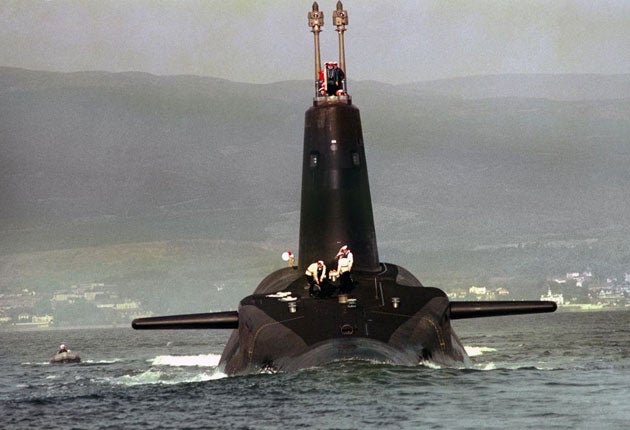Arguments about the need to replace the Trident nuclear weapons system will continue to rage until the next general election after the Prime Minister announced a delay of at least six years.
David Cameron said the Government would extend the life of the Vanguard class of submarines which carry the UK's nuclear deterrent, so that the decision to start construction of new submarines need not be taken until "about 2016".
The decision was welcomed by anti-nuclear campaigners and eases potential conflict between the Conservatives and Liberal Democrats over the future of Trident.
Some Conservative MPs fear that such a long delay could undermine the effectiveness of Trident, but Mr Cameron insisted the UK will retain its nuclear deterrent despite today's cost-saving announcement.
The Prime Minister has always maintained that the UK should keep the deterrent, and replacing Trident was a Conservative manifesto pledge in the last general election.
As part of the coalition deal between the Conservatives and Liberal Democrats, an agreement was made to study the programme to ensure value for money.
Supporters of Trident have argued that the nuclear industry could be hit unless the system was replaced, threatening thousands of job losses.
Under the programme, the Royal Navy operates 58 nuclear-armed submarine-launched ballistic missiles and around 200 nuclear warheads on four Vanguard-class ballistic missile submarines from Clyde Naval Base on Scotland's west coast.
At least one of these submarines is always on patrol as a continuous at-sea deterrent, armed with up to 16 Trident missiles and around 48 nuclear warheads, although each submarine can carry up to 160 nuclear warheads with 10 warheads per missile.
Developed and manufactured by Lockheed Martin in the United States, Trident entered service with the Royal Navy in 1994, 14 years after it was selected as the replacement for the submarine-launched Polaris missile.
Each Trident missile has a range of up to 7,500 miles and is accurate to within a few feet. Their destructive power is estimated as the equivalent of eight Hiroshimas.
The current Vanguard-class submarines were built at what is now BAE Systems Submarine Solutions in Barrow-in-Furness, Cumbria, the only submarine yard in the country.
Kate Hudson, general secretary of the Campaign for Nuclear Disarmament, said: "Pushing this decision back to after the next election will hopefully allow politicians to catch up with what the majority of the public and a growing number of military voices acknowledge - that nuclear weapons are a costly irrelevance to the threats Britain faces."
Subscribe to Independent Premium to bookmark this article
Want to bookmark your favourite articles and stories to read or reference later? Start your Independent Premium subscription today.


Join our commenting forum
Join thought-provoking conversations, follow other Independent readers and see their replies